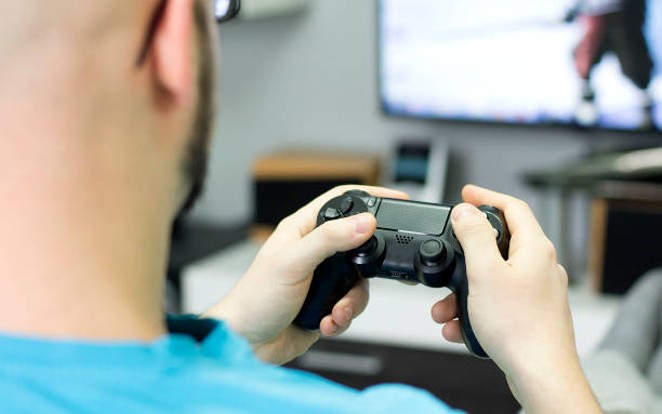WHO Classified Gaming Disorder for First Time, But Experts Say to Beware of Misdiagnosing Gamers
By Megan Rodriguez on Fri, Jul 20, 2018 at 11:58 am
Waking up groggy on Monday morning after a late night of video gaming doesn't make you an addict. Or does it?
The World Health Organization (WHO) recently released the latest update of its International Classification of Diseases, for the first time identifying gaming disorder as an addictive behavior disorder. It's the first time a major health organization has given gaming that classification, but there is still plenty of debate surrounding the issue.
The WHO's change comes five years after the American Psychiatric Association recommended further research of gaming addiction but said there wasn't sufficient evidence to classify it as a mental disorder.
The new classification is warranted because of a movement in the medical field to recognize addictive behaviors extend beyond drug addiction, according to John Roache, who heads UT Health San Antonio's Division of Alcohol and Drug Addiction.
“Any behavior that is engaged in compulsively, excessively, starts to interfere with function and causes problems is potentially identifiable as an addictive behavior,” Roache said.
However, he warns not to assume everyone who plays a lot of video games is an addict.
"[The classification] introduces the possibility of pathologizing, or labeling, any of that behavior as a problem needing treatment, which is not necessarily the case," Roache said. "Teenagers might [play games] a lot, but in psychiatric terms, it is only a disorder if it is really causing problems and the individual is unable to control themselves."
Trinity University Communication Professor Aaron Delwiche said he's skeptical of the WHO decision because there's still a lack of research consensus.
“In the late 19th Century, cultural critics were saying the same things about the novel that they say about video games today, including the allegation that they are addictive,” said Delwiche, who studies video games and emerging digital media. “I think there is a tendency to be suspicious about emerging media, especially emerging media that consumes a lot of time and attention of young people.”
Among other benefits, gaming can improve leadership, social skills and strategic reasoning, Delwiche said. What's more, a 2016 study about internet gaming disorder in the American Journal of Psychiatry found fewer than 1 percent of people “might qualify for a potential acute diagnoses” for gaming addiction.
“My concern is that benefits will be overlooked because parents will point to the World Health Organization’s classification and use it as justification for inappropriate limits on screen time that, in my opinion, could actually do more harm to their children than good,” Delwiche said.
Roache cautioned both parents and mental health professionals to be wary of misdiagnosing the disorder.
“The biggest concern is now that this has been named as a medical psychiatric condition that many kids will get mislabeled by their parents or by other professionals who don’t necessarily have the skills to differentiate between time spent and an addictive disorder,” Roache said. “Just because you spend a lot of time doing something doesn’t, in and of itself, mean it is a problem.”
Stay on top of San Antonio news and views. Sign up for our Weekly Headlines Newsletter.
The World Health Organization (WHO) recently released the latest update of its International Classification of Diseases, for the first time identifying gaming disorder as an addictive behavior disorder. It's the first time a major health organization has given gaming that classification, but there is still plenty of debate surrounding the issue.
The WHO's change comes five years after the American Psychiatric Association recommended further research of gaming addiction but said there wasn't sufficient evidence to classify it as a mental disorder.
The new classification is warranted because of a movement in the medical field to recognize addictive behaviors extend beyond drug addiction, according to John Roache, who heads UT Health San Antonio's Division of Alcohol and Drug Addiction.
“Any behavior that is engaged in compulsively, excessively, starts to interfere with function and causes problems is potentially identifiable as an addictive behavior,” Roache said.
However, he warns not to assume everyone who plays a lot of video games is an addict.
"[The classification] introduces the possibility of pathologizing, or labeling, any of that behavior as a problem needing treatment, which is not necessarily the case," Roache said. "Teenagers might [play games] a lot, but in psychiatric terms, it is only a disorder if it is really causing problems and the individual is unable to control themselves."
Trinity University Communication Professor Aaron Delwiche said he's skeptical of the WHO decision because there's still a lack of research consensus.
“In the late 19th Century, cultural critics were saying the same things about the novel that they say about video games today, including the allegation that they are addictive,” said Delwiche, who studies video games and emerging digital media. “I think there is a tendency to be suspicious about emerging media, especially emerging media that consumes a lot of time and attention of young people.”
Among other benefits, gaming can improve leadership, social skills and strategic reasoning, Delwiche said. What's more, a 2016 study about internet gaming disorder in the American Journal of Psychiatry found fewer than 1 percent of people “might qualify for a potential acute diagnoses” for gaming addiction.
“My concern is that benefits will be overlooked because parents will point to the World Health Organization’s classification and use it as justification for inappropriate limits on screen time that, in my opinion, could actually do more harm to their children than good,” Delwiche said.
Roache cautioned both parents and mental health professionals to be wary of misdiagnosing the disorder.
“The biggest concern is now that this has been named as a medical psychiatric condition that many kids will get mislabeled by their parents or by other professionals who don’t necessarily have the skills to differentiate between time spent and an addictive disorder,” Roache said. “Just because you spend a lot of time doing something doesn’t, in and of itself, mean it is a problem.”
Stay on top of San Antonio news and views. Sign up for our Weekly Headlines Newsletter.

KEEP SA CURRENT!
Since 1986, the SA Current has served as the free, independent voice of San Antonio, and we want to keep it that way.
Becoming an SA Current Supporter for as little as $5 a month allows us to continue offering readers access to our coverage of local news, food, nightlife, events, and culture with no paywalls.
Scroll to read more San Antonio News articles
Newsletters
Join SA Current Newsletters
Subscribe now to get the latest news delivered right to your inbox.

















